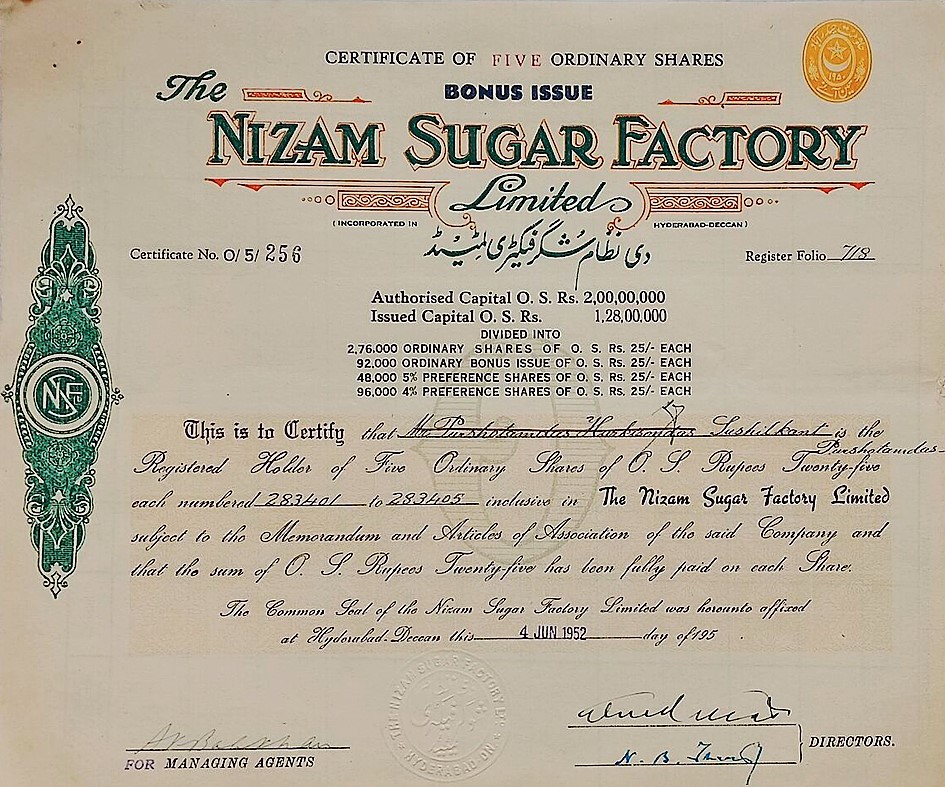Nizam Sugar Factory was established in 1937 during the reign of the last Nizam of the
Kingdom of Hyderabad, Mir Osman Ali
It was sold to a private company, Delta Paper Mills, in 2002 by the then government
As part of the process to revive the Nizam Sugar Factory (NSF), MLAs held a meeting with farmers. They have made it clear that the factory revival will take shape only if the farmers give a commitment that they will cultivate sugarcane on a large scale. If farmers take up sugarcane cultivation on a large scale, a steady supply of raw material required for NSF can be ensured, according to political leaders and officials.
The state government paid Rs 190 crore out of Rs 400 crore bank loans under a one-time settlement. A special committee has been conducting meetings with farmers. The government has also formed a committee to begin the process of NSF revival. The farmers have, however, sought an assurance from the government that the minimum support price is guaranteed for the produce.
To restart crushing operations at the Nizam Sugar Factory, a minimum of 3,500 metric tonnes of sugarcane is required every day for crushing to keep the unit running in a season which means 130 days in a year. Meanwhile, the ruling party MLAs have stated that, as promised ahead of the elections, the Nizam Sagar Factory will be reopened.
The Nizam Sugar Factory units were sold to a private company, Delta Paper Mills, in 2002 by the Chandrababu Naidu government. During the 2014 election campaign, the then TRS chief K Chandrashekar Rao promised to make Nizam Sugars a government entity. However, on December 23, 2015, three of the factory’s units were shut down due to layoffs. Despite a yield of 35,000 tonnes of sugarcane in 2005-2006, the factory, which had a yield of 100,000 tonnes in 2017, was closed. As a result, farmers shifted towards paddy cultivation. Now, if farmers in the Nizam Sagar Factory’s surrounding regions such as Bodhan, Muthyampet, and Mambhoji Palli show interest in cultivating sugarcane, the government is more likely to expedite the reopening of the factory.
If the factory is reopened, the local economy is expected to grow. The question remains whether the factories will be operated under the private sector, the government, or a cooperative model.
Many in the district believe that reopening the factories will benefit all sectors.
As per the election promises, the MLAs from the ruling party have stated that they are ready to reopen the Nizam Sugar Factory, and they have also held meetings with farmers.
The MLAs have assured the farmers that the government will support farmers who are willing to engage in sugarcane cultivation. There is a strong belief that reopening the Nizam Sugar Factory is essential for the welfare of farmers in the area.
The government has already paid Rs 190 crore loan and the farmers are expected to support sugarcane farming for the factories to be revived.
In a meeting attended by Bodhan MLA Sudarshan Reddy, Banswada MLA Pocharam Srinivas Reddy, and other MLAs along with the District Collector, discussions were held with farmers. They emphasised that if about 16,000 to 18,000 acres are cultivated with sugarcane, crushing operations can be carried out. Farmers are willing to start sugarcane farming if subsidies are provided.
Farmers are requesting that the government provide subsidies for sugarcane farming and prompt payments for their produce.
Farmers state that, in the absence of the factory, they have been selling their sugarcane to private buyers at lower prices.
They believe that if the factory reopens, many farmers will return to sugarcane farming.
Some farmers also suggest that scientists should provide guidance and recommendations to help them improve sugarcane cultivation. They believe that if they continue to grow sugarcane every year, it will be profitable.




